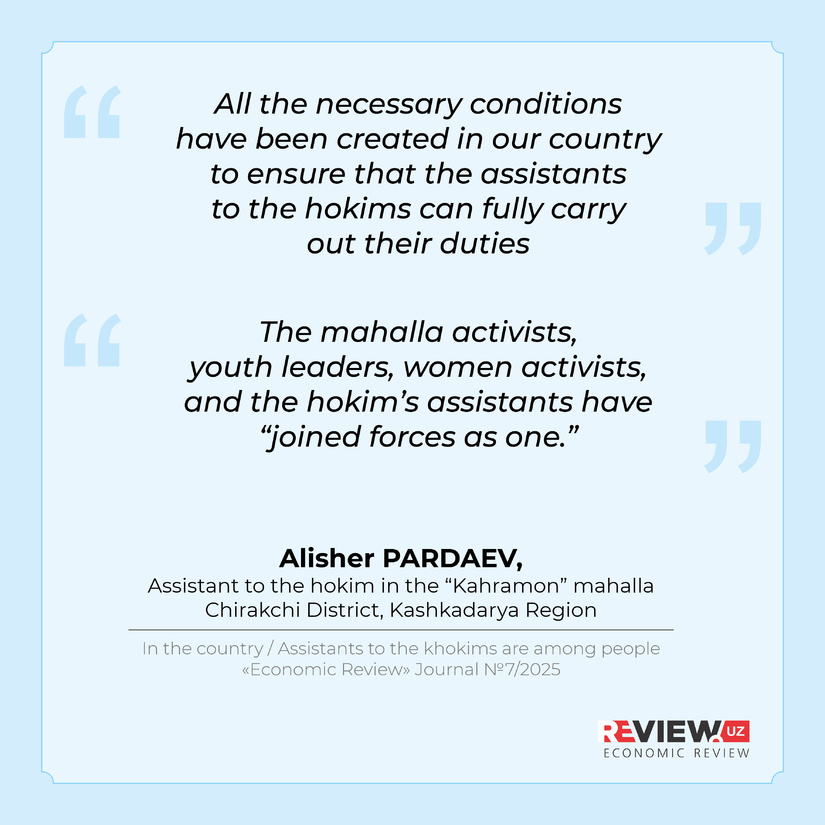— How did you begin your work in the mahalla?
— First of all, in order to maintain constant communication with the residents of the mahalla, we created a Telegram group called “Sokhil,” which includes residents of the mahalla working and studying abroad, as well as those living in other cities of the republic. The number of group members has already exceeded one thousand. This channel covers the activities of experienced entrepreneurs, business ideas, and ongoing initiatives in the region. Thanks to this channel, the legal literacy of the mahalla residents is improving, as well as their engagement in social changes.
A census of residents and households was conducted, and they were divided into four categories. It was found that low-income households accounted for 28.0% (175); households with stable income but wishing to increase it — 31.0% (194); households in need of social protection — 5.4% (31); and households in good economic condition — 35.5% (222). Based on the results of this survey, a “Roadmap” was developed to work with 369 households belonging to the 1st and 2nd categories.
Since our mahalla is conveniently located by the Kashkadarya River, fish farming was chosen as the main driver of development. In addition, there are good opportunities for the development of services (trade, public catering, bakery, production of tandoors, blocks, and bricks), crop cultivation (potatoes, carrots, and onions), poultry farming, and livestock breeding.
— The mahalla has accumulated solid experience in the development of fish farming. Could you tell us more about this?
— Today, more than 400 entrepreneurs in Chirakchi district are engaged in fish farming, and the Kakhramon, Sokhil, and Chiljuvut mahallas specialize in this field. In addition, in these mahallas there is a natural warm spring of 24°C, where clean water flows to the surface without the use of electricity or pumps.
In our mahalla, 304 residents are engaged in fish farming and other types of entrepreneurship on an area of more than 40 hectares, of which 30 hectares are natural ponds and over 10 hectares are developed using intensive (greenhouse) methods. To date, fish farming facilities have been built for 140 households, and greenhouses for 46 households.
Mainly, African catfish are bred here, with an annual production of 9.0 thousand tons of fish. The current wholesale price for fish products is: African catfish — 20,000, carp — 55,000, silver carp — 40,000, grass carp — 50,000, which are sold both in domestic and foreign markets.
Entrepreneurs also plan to breed fish species adapted to local climatic conditions. In the future, the possibility of producing canned fish products and exporting them to neighboring countries is being considered.
— How is the issue of unemployment being addressed in the mahalla?
— During 2022–2024, 207 unemployed citizens were employed in textile enterprises, 15 in catering establishments, and 60 in enterprises of other sectors. In addition, 70 unemployed citizens were allocated land plots ranging from 30 to 50 hectares. To ensure employment, 64 families were provided with sewing machines, and 198 citizens were employed.
In my work, I also pay special attention to women’s employment. In particular, this year, 7 women listed in the “Women’s Notebook” were provided with preferential loans to start entrepreneurial activities. In addition, sewing workshops were opened in two households in our mahalla on the basis of home-based work.
— What is being done to improve the mahalla?
— With the help of mahalla residents and sponsors, 192 households were provided with drinking water, 14 km of internal roads were asphalted, 6.5 km of drainage ditches were cleaned, one transformer and 20 power poles were installed. In addition, with sponsor funds, two artesian wells were drilled in the mahalla, providing about 200 households with clean drinking water.
As part of the third stage of this year’s participatory budgeting initiative, projects for asphalting 2.5 km of road from Kakhramon village and 2.5 km from Buirachi village were declared winners. To date, the works on these projects have been fully completed. Within the framework of the nationwide project “Yashil Makon” (“Green Space”), more than 2,500 fruit trees (apple, apricot, almond, grape) have been planted in the mahalla.
The full version of the interview is available at: here
Jamoliddin Turdimov, CERR
"Economic Review" Journal №7/2025





















leave a comment